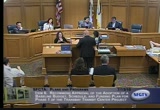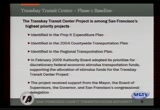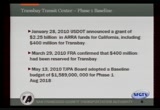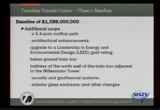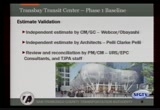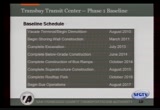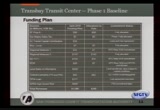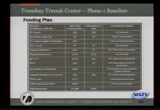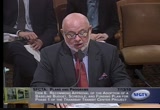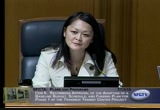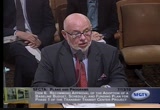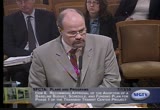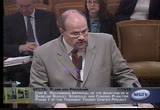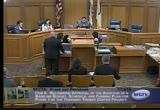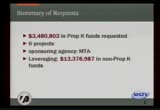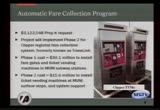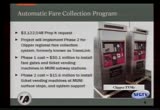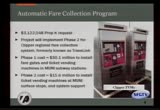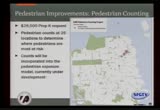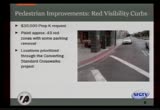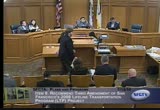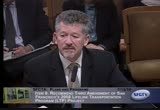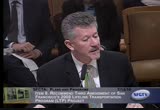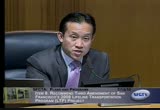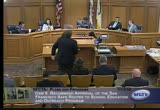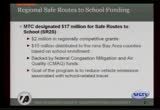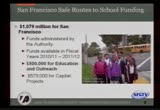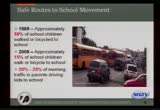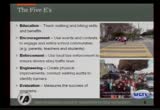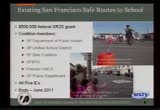tv [untitled] September 4, 2010 3:30pm-4:00pm PST
4:30 pm
recommend approval of the adoption of a baseline budget schedule and funding plan for phase 1 of the transbay transit center project. this is an action item. >> the project has three phases. the extension is referred to as phase two, and the redevelopment plan. in november 2007, the djba adopted a budget of 1 ,189,000,000. that included the foundations to prepare for future construction
4:31 pm
of the terminal. in this diagram, we show the bottom part boxed in gray would not be part of this initial scope. basically just the above ground portion, the foundations. the transbay center project is among san francisco's highest- priority project, identified as such in 3 plans. february last year, this board adopted the funding and supported the transbay transit center project to receive funds. the project has received support
4:32 pm
from the mayor, governors, and congressional delegation. in january 28 of this year, the department of transportation announced a grant of 2.25 billion dollars in ara funds for california, and included $700 million for the transbay transit project. the federal agency of the department of transportation charged with administring lfm's confirmed that $700 million has been reserved for the transbay transit center. the board adopted a new baseline budget of $1.5 billion, which basically added $4 million and
4:33 pm
4:34 pm
packet, but -- there is the contractor and another separate estimate done by the architects. after those estimates are done independently, they are reviewed and reconciled by the public construction managers for the program and by the staff, so there is a good level of comfort that the project will be built within that budget.
4:35 pm
here you have the schedule for the project. significantly, august 7 of this year, about a month away, service will begin at the temporary bus terminal. bus services will be moved to the temporary terminal and demolition will begin of the existing structure. construction will start in march, and excavation will be complete in 2013. the train lines added 2 years to the schedule, so buses are 2017
4:36 pm
as opposed to 2015 as planned, but it will be more comlpete a facility and cheaper in the long run. here we have the funding plan. as you see, the project is fully funded at this point. both staff and the authority recognizes this budget has some risks. second, because of the real estate market right now. interestingly enough, the delay of the project caused by the
4:37 pm
years added to the schedule does a favor, because it allows the land to recover its value and regenerate it. it is also a motion that the tjpa has aggressively and vigilantly been looking for in case these funds do not mature. that concludes our presentation. commissioner campos: thank you. any questions? commissioner chu: phase 1, you talked about the scope of the work. i understand with $400,000 that is moving something that would have been phase 2 forward to
4:38 pm
phase 1. what is the scope and value for phase 2? >> phase 2 is 2.5 billiloon dollars, and it is basically the extension of the train service to the transbay terminal and also the future high-speed rail also to go through the terminal, and it also includes the outfitting of the terminal itself, the underground terminal, that would build the box itself, but the track and systems and everything else will be built in phase 2. commissioner campos: and that would mark the completion of high-speed rail, etc.? >> it may be that one precedes
4:39 pm
the other. they are thinking they could have the terminal created before. commissioner chu: ok. and a quick question about $429 million assumed as funding for phase 1, that area may experience some weakness. what are plans to deal with what the drops may be? >> well, estimates were based on 2007 numbers, so the value of the land has decreased. however, like i mentioned, the extension of the project will allow for the market to recover.
4:40 pm
tjp was looking at multiple other sources to make up for that gap. i think i am going to have somebody from tjp -- we don't know what the gap is. it's a moving target, and they are more aware of where things are. commissioner campos: thank you. >> for the $429 million projected in phase 1, first i think it is important to note that doesn't represent all of the land the city is receiving from the state of california,
4:41 pm
there are some parcels whose revenue was earmarked for phase 2, so there is potential to sell those earlier to help offset shortages and revenue in phase 1. the second issue is that we saw a significant funding damp on phase 2, and lewis said we would continue to pursue additional funding from the federal government under high speed rail or other programs to close phase 2, and where possible we may be able to swap out funding, moving landfills on time to allow greater opportunity to recover value, or some of those
4:42 pm
sources are applicable to phase 1. the third area of opportunity we are looking at is the potential to bring it under cost so it can contain the cost of the program. as you may be aware, a number of projects have come in with competitive pricing of the contracts. our first represents more than 20% of our estimated phase 1 costs, so the bid results on
4:43 pm
4:44 pm
municipal transportation agency for 6 requestis, subject to the attached fiscal year cash flow distribution schedules. this is an action item. >> good afternoon. the request totals 3.4 million dollars, leveraging over $13.4 million in prop k funds, better than expected in the expenditure plan. these projects have been funded by past prop k allocations. you will see those in particular for projects where we recommendm multi-phase allocations where
4:45 pm
the design phase is straightforward. the first project is for $3.1 million for the automatic fare collection program, the clipper fare collection system, the bay area's translink card. by fall of 2011, clipper will by the exclusive payment system, so all transfers and the transition plan, shown on page 64 on your packet so you can get an idea of the schedule for implementation of the project. this is a two-phase project, managed by mtc, who holds the operate and maintain contract,
4:46 pm
and there is an mou in place for phase 1, for phase 1 systems, so the mou will be amended to encompass these two, the subject of this request. section 2 will be funded by prop k and formula funds. the system is currently accepted in ferry, mta, and vta will offer clipper in 2010. the clipper program is also included on page 55 of your packets, a presentation prepared by the mta for the board. the overall project is funded by a variety of federal, state, and local funds. an $11 million stimulus grant
4:47 pm
for phase 1. phase 2 is [inaudible] dollars. phase 2 will install ticket vending machines at several stops and provide project support. procurement will begin this summer with project compleion expected by spring of 2013. the second project is the light rail corridor improvement, a $100,000 request to leverage almost $500,000 in federal funds to upgrade signals at 115 locations, over 50 on the line and shown to be improved under the project.
4:48 pm
it will also upgrade pavement markings to enhance no u-turn instructions. the counting project will do counts at 25 locations this fll, to complement 25 studied last fall and reocmmendation will be in a pedestrian exposure model based on volume and collision history. past allocation has provided for consultant services for model development. pedestrian improvement projects, $125 million to convert twenty locations from standard to continental, and
4:49 pm
these locations have been prioritized based on speed, generators, and so forth. locations will be coordinated among two projects. submit requests to the mta for these locations at www.sfmta.org/walk, and some improvements may improve parking, so there are some design costs incorporated in the project. last is the school crosswork -- crosswalk improvement project. i welcome any questions you might have. commissioner campos: thank you very much for your presentation.
4:50 pm
why don't we open it up for public comment? any member of the public? seeing none, public comment is closed. colleagues, no questions? we have a motion by avalos, seconded by carmen chu. we can take that without objection. thank you very much. next item. clerk cheng: recommend third amendment of san francisco's 2008 lifeline transportation program project priorities to include $1,691,391 for the municipal transportation agency's bus service restoration project. >> we have items that need to be
4:51 pm
resolved before we are ready to recommend this item. i want to acknowledge the importance of the item, because we are talking about additional money. so i would have the importance of doing committee work at committee, but also i would respectfully suggest you hold a meeting at 10:00 a.m. next tuesday of the committee so you can act on this item and get the future resolved in time to feed into the process of restoring service at the mta. commissioner campos: thank you,k commissioner. i don't have a problem holding a special meeting, but there is
4:52 pm
4:53 pm
>> some of the allocations would fit into the process. i think it is important to clarify what your asking here. supervisor campos: david chiu? supervisor chiu: i generally agree with the chair person that we should try to do as much as possible. unfortunately, this happens to be the busiest month of the year with the budget, other items and other committees, and all the various projects, i might suggest that we pass in and out of this body without recommendation and await the briefing before the next full meeting, and then we can assess from there. supervisor campos: i would be supportive of that. why don't we open this up to
4:54 pm
public comment before we act on that. is there any member of the public that would like to speak on this item? seeing none, public comment is closed. we have a motion by david chiu, seconded by supervisor avalos. colleagues? thank you. we have been joined by bevan dufty. next item. >> recommend approval of the san francisco safe routes to school education and outreach program for $500,000 in cycle 1 safe routes to school funds. >> good morning. transportation planner with the authority. this item start on page 83 of your packet. we also have a power point presentation on your desk. in december 2009, the metropolitan transportation commission began our program for
4:55 pm
funds. the first three years of that goes from fiscal year 2007 through 2010. as far as we know, this is the first regional transit government that has been funded by these funds. of the $17 million, $2 million was reserved for regionally competitive the correct. i am happy to say the san francisco public-school coalition is applying for a 51 of the dollar grant for a sustainable curriculum at high schools. $15 million of the $17 million was based on school enrollment.
4:56 pm
because they are backed by those funds, the program is very much to reduce vehicle emissions associated with school-related travel. by way of introduction, when mtc introduced this item to us, they were hopeful the county's would find the education of reach as opposed to capital projects, but both are eligible. of the $15 million, over $1 million came to the city. those funds are available in fiscal year 11 and 12. we have decided, along with the school bus coalition, to split the money in half, five under thousand dollars for education outreach, -- $500,000 for education of reach, capital projects. -- outreach, capital projects.
4:57 pm
this is a nationwide movement. the trend that we most often look at ouare -- 25% of morning traffic is driving kids to school. it goes without saying, but there is an immense amount of public health, safety impacts. how could obesity, asthma rates, more traffic around the school, global warming. we would encourage kids to walk and back-to-school period the . the best way to look at this is through the five e's. 4osáeducation is essentially
4:58 pm
teaching walking and biking skills. the current school system to teach as bike safety glasses to fourth graders. encouragement. the use of contests to encourage parents and kids to walk and a bike to school. there is a current bike to school day. engineering, to create physical improvements and to identify barriers. evaluation. doing travel service, parents surveys to see what those barriers are and how many kids are actually walking. there is a short outline about the project. they have just completed their first year.
4:59 pm
they have one more year of funding. in that, they will be adding 10 more schools. our funding begins in the 2011 school year. coalition members are sitting in the back of the room today. the department of public health is here, san francisco unified school district, san francisco bike coalition, presidio ycma, and police commission. this is very much focused on safety and teaching pedestrians bicycle safety. as i stated, funding for existing programs and in june 2011 will be coming in right around the beginning of the school year. this is a map of
76 Views
IN COLLECTIONS
SFGTV: San Francisco Government Television Television Archive
Television Archive  Television Archive News Search Service
Television Archive News Search Service 
Uploaded by TV Archive on

 Live Music Archive
Live Music Archive Librivox Free Audio
Librivox Free Audio Metropolitan Museum
Metropolitan Museum Cleveland Museum of Art
Cleveland Museum of Art Internet Arcade
Internet Arcade Console Living Room
Console Living Room Books to Borrow
Books to Borrow Open Library
Open Library TV News
TV News Understanding 9/11
Understanding 9/11